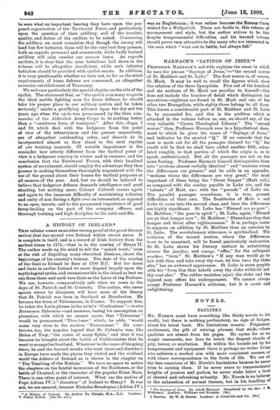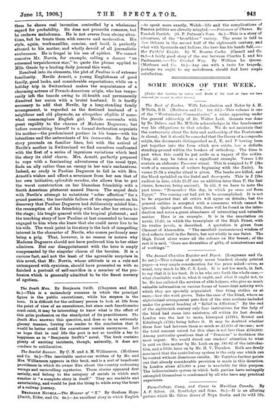NOVELS.
PAULINE.f
Mn. NORRIS must have something like thirty novels to his credit, but there is nothing perfunctory, no sign of fatigue, about his latest book. His limitations remain. Poignancy, excitement, the gift of coining phrases that stick,—these qualities are absent from his pages. He opens for us no magic casements, nor does he touch the deepest chords of pity, terror, or exultation. But within the bounds set by his temperament and equipment there is perhaps no writer living who achieves a modest aim with more consistent success, or with closer correspondence to the facts of life. We are all the less conscious of Mr. Norris's limitations because he never tries to outstep them. If he never soars to transcendental heights of passion and pathos, he never sinks below a level of shrewd and refreshing urbanity. Mr. Norris is no believer in the exhaustion of normal themes, but in his handling of The Sayings of Jesus. By Adolf Beranek. Translated by the Bev. 2. Wilkinson. London : Williams and Norgate. [68.]
t Pauline. By W. E. Norris. London : A. Constable and Co. [Si.]
them he billows real invention controlled by a wholesome regard for probability. He does not proscribe romance, but he etchedis melodrama. He is not averse from strong situa- tions, but he treats them with reserve and moderation. His style, again, workmanlike, concise, and lucid, is perfectly attuned to his matter, and wholly devoid of all journalistic exuberance. He is frugal in his use of epithet. We cannot conceive Mr. Norris, for example, calling a dancer "an esteemed terpsichorean star," to quote the phrase applied to Mlle. Gene* by a leading daily journal this week.
Resolved into its elements, the plot of Pauline is of extreme familiarity. Nevile Arnott, a young Englishman of good family, good looks, and considerable expectations, while on a holiday trip in Switzerland makes the acquaintance of a charming actress of French-American origin, who has tempo- rarily left the boards owing to ill-health and permanently dissolved her union with a brutal husband. It is hardly necessary to add that Nevile, by a long-standing family arrangement, is regarded as the destined husband of a neighbour and old playmate, an altogether eligible if some- what commonplace English girl. Nevile succumbs with great rapidity to the charms of Madame Daguerre ; but before committing himself to a formal declaration acquaints his mother—the predominant partner in his home—with his intentions and the antecedents of his inamorata. So far the story proceeds on familiar lines, but with the arrival of Nevile's mother in Switzerland we find ourselves confronted with the first of a series of ingenious variations which lend the story its chief charm. Mrs. Arnott, perfectly prepared to cope with a fascinating adventuress of the usual type, finds an ally rather than an enemy in her son's enchantress. Indeed, so ready is Pauline Daguerre to fall in with Mrs. Arnott's wishes and effect a severance from her son that of her own initiative, splendide mendax, she allows him to put the worst construction on her blameless friendship with a South American plutocrat named Ibarra. The sequel deals with Nevile's attempt to substitute " sober affection" for a grand passion ; the inevitable failure of the experiment on his discovery that Pauline Daguerre had deliberately misled him ; the resumption of his friendship with her after her return to the stage ; his tragic quarrel with the tropical plutocrat ; and the touching story of how Pauline at last consented to become engaged to him when she knew that she could never live to be his wife. The weak point in the story is the lack of compelling interest in the character of Nevile, who comes perilously near being a prig. That, however, is no reason in nature why Madame Daguerre should not have preferred him to her other admirers. But our disappointment with the hero is amply compensated by the singular charm of the heroine. It is a curious fact, and not the least of the agreeable surprises in this novel, that Mr. Norris, whose attitude is as a rule not untempered with cynicism, should have presented us with so finished a portrait of self-sacrifice in a member of the pro- fession which is generally admitted to be the finest nursery of egotism.







































 Previous page
Previous page